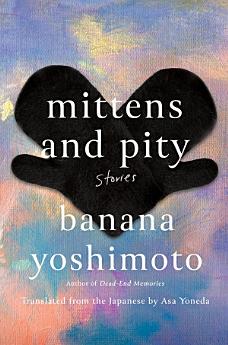Mittens and Pity: Stories
មករា 2027 · Catapult
សៀវភៅអេឡិចត្រូនិច
family_home
មានសិទ្ធិ
info
infoសៀវភៅនេះនឹងមាននៅថ្ងៃទី 5 មករា 2027។ អ្នកនឹងមិនត្រូវបានគិតប្រាក់ទេ រហូតដល់វាចេញផ្សាយ។
អំពីសៀវភៅអេឡិចត្រូនិកនេះ
Winner of the Tanizaki Prize in 2022, her latest short story collection from 2021, Mittens and Pity is what Yoshimoto calls the greatest achievement of her writing life since Dead-End Memories
Set between Kanazawa, Helsinki, Taipei, Rome, Hong Kong, and Hachijo-jima, the six stories collected here depict people who are struggling with recent loss and coming to terms with the truth of living with the memory.
In the title story, a couple takes a honeymoon to Helsinki after both mothers, who had been against their marriage, passed away. In “Sinsin and the Mouse,” a daughter who has dedicated her young adult life to caring for her sick mother, travels to Taipei after her mother’s death, slowly adjusting to her new freedom and loneliness. In “Caronte,” seeking closure from the accidental death of her best friend, a woman follows the last footstep of her best friend in Rome and encounters the person who has been holding her friend’s final message.
Instead of fighting with their pain, women in Mittens and Pity observe their emotions and find a tiny sparkle in the moment. Yoshimoto has been writing about loss since her debut and this collection showcases what Yoshimoto has been trying to achieve in the last thirty years. Mittens and Pity is wise, compassionate, and hopeful. Yes, as always, food heals the human soul in this collection. Yes, this is the best Banana Yoshimoto literature.
Set between Kanazawa, Helsinki, Taipei, Rome, Hong Kong, and Hachijo-jima, the six stories collected here depict people who are struggling with recent loss and coming to terms with the truth of living with the memory.
In the title story, a couple takes a honeymoon to Helsinki after both mothers, who had been against their marriage, passed away. In “Sinsin and the Mouse,” a daughter who has dedicated her young adult life to caring for her sick mother, travels to Taipei after her mother’s death, slowly adjusting to her new freedom and loneliness. In “Caronte,” seeking closure from the accidental death of her best friend, a woman follows the last footstep of her best friend in Rome and encounters the person who has been holding her friend’s final message.
Instead of fighting with their pain, women in Mittens and Pity observe their emotions and find a tiny sparkle in the moment. Yoshimoto has been writing about loss since her debut and this collection showcases what Yoshimoto has been trying to achieve in the last thirty years. Mittens and Pity is wise, compassionate, and hopeful. Yes, as always, food heals the human soul in this collection. Yes, this is the best Banana Yoshimoto literature.
អំពីអ្នកនិពន្ធ
BANANA YOSHIMOTO is the author of the international bestseller Kitchen. She has published eleven books in English translation, including Moshi Moshi and Dead-End Memories. She was born in Tokyo in 1964 and graduated from Nihon University College of Art, where she majored in literature. She debuted as a writer in 1987 with Kitchen, a novella that won her the Kaien Newcomer Writers Prize. In 1988, Moonlight Shadow, her thesis story, was awarded the Izumi Kyoka Prize for Literature. Then in 1989, she received two accolades: the Minister of Education's Art Encouragement Prize for New Artists for Kitchen and Utakata/Sanctuary, and the Yamamoto Shugoro Prize for Goodbye Tsugumi. In 1995, she won the Murasaki Shikibu Prize for Amrita, a full-length novel. And in 2000, Furin to Nambei, a collection of stories set in South America, received the Bunkamura Deux Magots Literary Prize. Most recently in 2022, she won the Tanizaki Prize for Mittens and Pity. Her work has been translated and published in more than thirty countries, and she has won several awards outside of Japan. In Italy, she won the Scanno Literary Prize in 1993, the Fendissime Literary Prize in 1996, the Maschera d’Argento Prize in 1999, and the Capri Award in 2011.
ASA YONEDA is the translator of Dead-End Memories and Moshi Moshi, as well as Idol, Burning by Rin Usami and The Lonesome Bodybuilder by Yukiko Motoya.
ASA YONEDA is the translator of Dead-End Memories and Moshi Moshi, as well as Idol, Burning by Rin Usami and The Lonesome Bodybuilder by Yukiko Motoya.
អានព័ត៌មាន
ទូរសព្ទឆ្លាតវៃ និងថេប្លេត
ដំឡើងកម្មវិធី Google Play Books សម្រាប់ Android និង iPad/iPhone ។ វាធ្វើសមកាលកម្មដោយស្វ័យប្រវត្តិជាមួយគណនីរបស់អ្នក និងអនុញ្ញាតឱ្យអ្នកអានពេលមានអ៊ីនធឺណិត ឬគ្មានអ៊ីនធឺណិតនៅគ្រប់ទីកន្លែង។
កុំព្យូទ័រយួរដៃ និងកុំព្យូទ័រ
អ្នកអាចស្ដាប់សៀវភៅជាសំឡេងដែលបានទិញនៅក្នុង Google Play ដោយប្រើកម្មវិធីរុករកតាមអ៊ីនធឺណិតក្នុងកុំព្យូទ័ររបស់អ្នក។
eReaders និងឧបករណ៍ផ្សេងទៀត
ដើម្បីអាននៅលើឧបករណ៍ e-ink ដូចជាឧបករណ៍អានសៀវភៅអេឡិចត្រូនិក Kobo អ្នកនឹងត្រូវទាញយកឯកសារ ហើយផ្ទេរវាទៅឧបករណ៍របស់អ្នក។ សូមអនុវត្តតាមការណែនាំលម្អិតរបស់មជ្ឈមណ្ឌលជំនួយ ដើម្បីផ្ទេរឯកសារទៅឧបករណ៍អានសៀវភៅអេឡិចត្រូនិកដែលស្គាល់។







